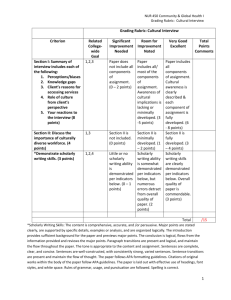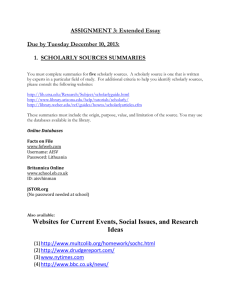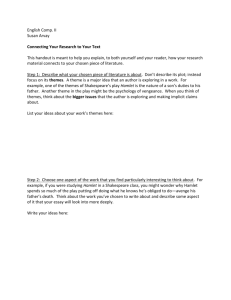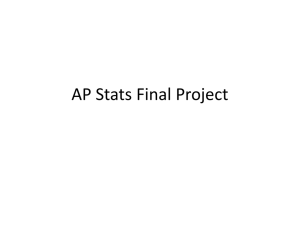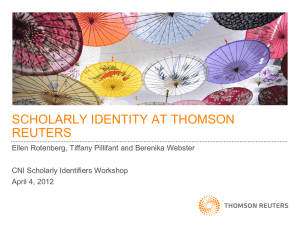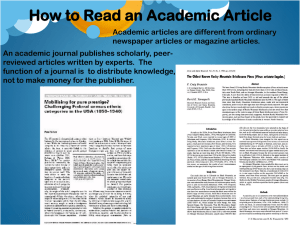Scholarly Writing Tips
advertisement
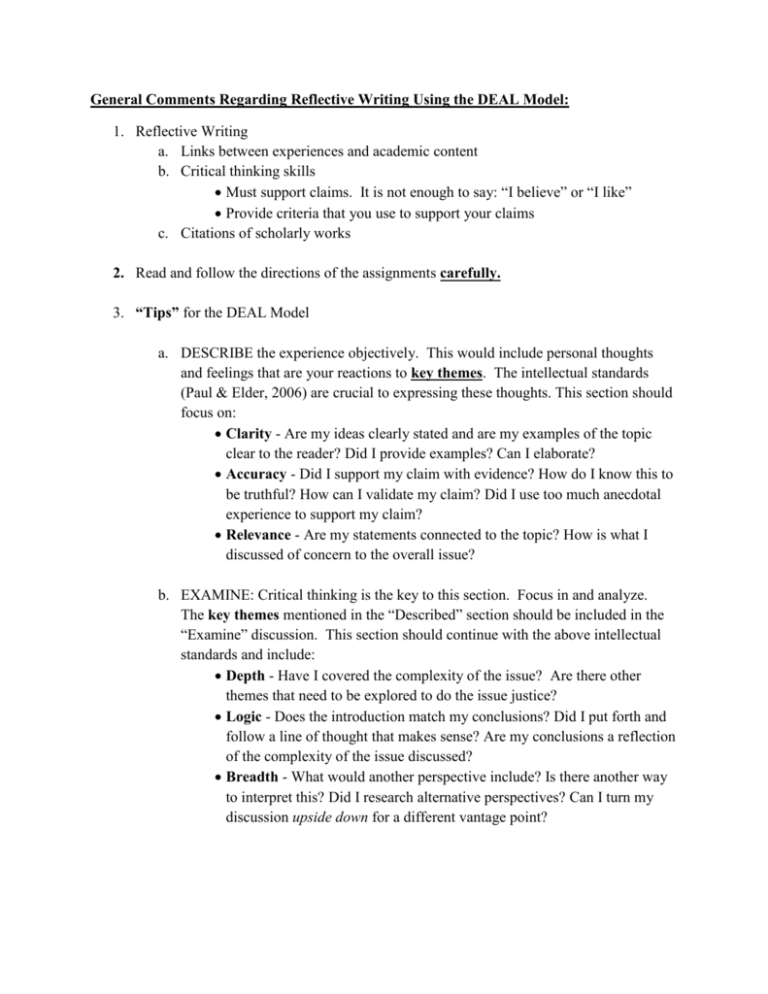
General Comments Regarding Reflective Writing Using the DEAL Model: 1. Reflective Writing a. Links between experiences and academic content b. Critical thinking skills Must support claims. It is not enough to say: “I believe” or “I like” Provide criteria that you use to support your claims c. Citations of scholarly works 2. Read and follow the directions of the assignments carefully. 3. “Tips” for the DEAL Model a. DESCRIBE the experience objectively. This would include personal thoughts and feelings that are your reactions to key themes. The intellectual standards (Paul & Elder, 2006) are crucial to expressing these thoughts. This section should focus on: Clarity - Are my ideas clearly stated and are my examples of the topic clear to the reader? Did I provide examples? Can I elaborate? Accuracy - Did I support my claim with evidence? How do I know this to be truthful? How can I validate my claim? Did I use too much anecdotal experience to support my claim? Relevance - Are my statements connected to the topic? How is what I discussed of concern to the overall issue? b. EXAMINE: Critical thinking is the key to this section. Focus in and analyze. The key themes mentioned in the “Described” section should be included in the “Examine” discussion. This section should continue with the above intellectual standards and include: Depth - Have I covered the complexity of the issue? Are there other themes that need to be explored to do the issue justice? Logic - Does the introduction match my conclusions? Did I put forth and follow a line of thought that makes sense? Are my conclusions a reflection of the complexity of the issue discussed? Breadth - What would another perspective include? Is there another way to interpret this? Did I research alternative perspectives? Can I turn my discussion upside down for a different vantage point? c. ARTICULATE LEARNING: This section, facilitate the learning cycle. 1. What Did I Learn? The “What did I learn?” question requires a discussion about what you learned as a result of reading the required writings and completing this critical reflection assignment. Revisiting key themes from previous sections helps. What did I learn about myself as a social worker? What did I learn about families/communities? Did I learn of any prejudices or biases? 2. How did I learn it? The “How did I learn it?” question requires a discussion about the critical reflection learning process utilized to write the assignment. Don’t repeat what you learned but report “how” you learned. 3. Why does it matter? Why is this learning important for me as a developing social worker? 4. What will I do in the future, in light of the learning? What is the next likely development? Consider micro/macro level Think about policy making Set goals d. SUMMARY - A brief summary paragraph. Conclusion. No new information should be introduced in the “Summary.” . 4. Remember to construct paragraphs around a central theme. Always check that following sentences remain on that theme and end each paragraph with a summary sentence which ties back to opening sentence. Your paragraph is probably too long and your focus has strayed if you find that you are writing about something different from your opening sentence. Scholarly Writing Tips Follow the instructions for the assignment Scholarly work is to be a presentation of the literature on the subject—not your subjective ideas. Start with an outline to organize your thoughts Refer to APA formatting and style at all times. Avoid beginning sentences with the following words: it, there, this, or that. Often these sentences are vulnerable and furthermore pronouns need references. Do not use contractions in scholarly writing Do not use slang words (children are not “kids” in scholarly writing) Mind your colloquialism. They do not belong in scholarly writing In reflection papers, the authors are not your friends (Walls is the author – not Jeanette) Do not name the title of a book or article in the body of your paper, use Authors. A paragraph is not one page Block quotes (those over 40 words) should be used very sparingly Punctuation is your friend – use periods. (this minimizes run on sentences) Make sure the title page is in correct format Use spell check carefully – it can change the words in a way that you may not catch without good proofreading There is no place in scholarly writing for inspirational quotations on the cover page or at the end Never cite Wikipedia Citing a dictionary could denote “filler” Make sure you check APA on the appropriate rules for using numbers Wide margins and space between paragraphs is not appropriate The reference page is always a new page Your location is Indiana University School of Social Work (there is no such thing as the IUPUI school of social work) Read your paper out loud to yourself Have a friend edit your paper I kept writing on several papers “precision and concision” Some sentences were too wordy…so Sentence styles might be an issue. Know when to use passive and active voice References Paul, R. & Elder, L. (2006). The miniature guide to critical thinking. Dillon Beach, CA: The Foundation for Critical Thinking.
